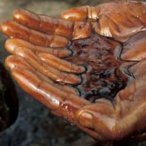English · français

21 de mayo de 2013 | Entrevistas | Agua | Acaparamiento de tierras | Anti-neoliberalismo | Bosques y biodiversidad | Derechos humanos | Industrias extractivas | Soberanía Alimentaria
No limits for land-grabbing in Uganda
Companies and Ugandan Government Together in the Oil Palm Business
Descargar: MP3 (8.2 MB)
A new research by Friends of the Earth International exposes the role of Wilmar and BIDCO corporations in a palm oil project being developed in Kalangala, on Bugala Island in Lake Victoria. The project is part of a government program supported by the International Fund for Agricultural Development (IFAD), a UN agency, and the World Bank. About 3,600 hectares of forest have already been destroyed, affecting the environment and local livelihoods.
«BIDCO did not buy land directly from communities. The government bought lands for the companies, so it is very much involved», said David Kureeba, Friends of the Earth Uganda campaigner and Project Officer Forests and Biodiversity at the National Association of Professional Environmentalists (NAPE).
There is a double effect producing these land-grabs: first, the governments involved want to expand their domestic production of food crops and crops for fuel.
«The government is looking at increasing the GDP, thinking it will benefit the communities when it actually benefits the corporations». Besides, agribusiness aims to expand its operations and profits by producing more cheaply and rapidly. Other drivers of land grabbing are certain types of environmental conservation projects, such as Reducing Emissions from Deforestation and Forest Degradation in Developing countries (REDD), which creates carbon credits from plantations, giving rise to «green grabbing». For instance, since plantations are included in the definition of forests, forested land is replaced by tree plantations aimed at generating carbon credits for companies.
This has many serious consequences, such as the displacement of populations, which affects local customs and cultures and leads to land conflicts and destruction of biodiversity. This is the result of deforestation or the cultivation of exotic species, which causes food insecurity through the reduction of local food supply, leading to a rise in prices. There are also health problems (exposure to agrochemicals, increase of prostitution in Kalangala due to the influx of migrants, and rise of HIV/AIDs infections).
Local communities were neither informed nor consulted about the palm oil project, and the national judiciary fails to take action: «Many of these projects are government projects, so, seeking justice may not be possible».
Some small farmers were forced to sell their land after planting palm oil because they were not able to pay for the fertilizer and other inputs needed. With no income from the oil palm, and no land for growing food, they had little option but to sell. Some of the main consequences of all this have been economic and food insecurity, lack of access to energy, casual and low-paid works, mainly occupied by men.
«The government answers to these effects that they’re creating employment. But the majority of the people that are walking in the plantations are not from Kalangala».
Wilmar International is mainly funded with shareholder’s money, bank loans and short-term trade finance from Europe and the US. So northern countries must consider their own responsibility in land-grabbing, which strongly affects developing countries.








